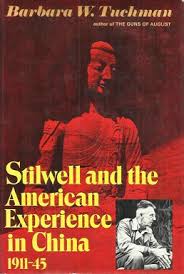OCTOBER 22, 2020 – Last night I finished reading Barbara Tuchman’s Stilwell and the American Experience in China – 1911 to 1945 (See my 9/3/20 post). Her thesis: America’s wartime policy toward China was a failure, and the outcome would’ve been more beneficial to our long-term interests had we not continued to back “G-mo”—Generalissimo Chiang Kai-shek—against the better judgment (and bitter frustration) of General Joseph “Vinegar Joe” Stilwell.
Stilwell, no fan of FDR, and whose politics were quite conservative in the traditional sense of the term, was nevertheless impressed by the Communists’ organizational skills, treatment of people’s basic needs, and above all, the Communists’ willingness to fight the Japanese—something “G-mo” wouldn’t do, despite gigantic gobs of Lend-Lease aid from the U.S. In Stilwell, the Communists found a man worthy of respect.
Toward the end of WW II, America’s continued support of the incompetent, corrupt, and repressive “G-mo” angered the Communists irretrievably, as far as America’s long-range interests were concerned. By 1949, the Communists had prevailed and chased “G-mo” to Taiwan, where the U.S. continued to support his regime, through thick and thin.
This week China celebrates the 70th anniversary of the “War to Resist U.S. Aggression and Aid Korea”—when hundreds of thousands of Chinese soldiers invaded Korea to counter MacArthur’s over-reach in the Korean War. The Chinese inflicted horrible losses and suffering on U.S. troops (See my post on 4/29/19)
The rest, shall we say, is history—including the sordid chapter of McCarthyism, the miscalculations of the Cold War, America’s loss of influence in mainland China, and so on. We’re still dealing with the fallout of bad policy in the hands of FDR and others in his Administration.
Much of that policy can be traced to earlier influence of American Christian missionaries in China—on American domestic politics. They created broad-based false impressions of reality in China, and not knowing any better, American voters pushed politicians on China policy that proved detrimental not only in our fight against Japan but in our post-war relations with China.
The fallout continues to this day, exacerbated by Trump’s trade war and rhetoric, spewed by no loftier ideal than red meat out of a can intended for his rabid base—a matter of crass domestic politics.
Then there’s North Korea, which will one day crumble altogether and perhaps with an explosion “that glows in the daylight,” creating a crisis that in its time will eclipse all else—except the outcome of the 2020 presidential election, since the resolution of the “Korea Crisis,” with its China factor, will depend mightily on who wins on November 3.
I doubt whether China or North Korea will figure much in tonight’s “debate” between Trump and Biden—except to the extent Trump lobs the spit-ball, “Joe’s weaker on “Chi-E-na than anyone in history” and Biden fires back by mentioning Trump’s personal business ties to the Red Giant. And I have even less faith in the American electorate giving two hoots about China or North Korea until . . . the inevitable crisis is upon us.
(Remember to subscribe to this blog and receive notifications of new posts by email.)
© 2020 by Eric Nilsson
